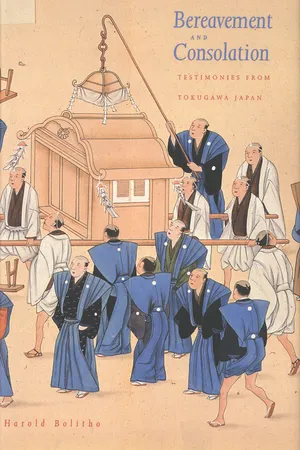
- English
- PDF
- Available on iOS & Android
About this book
Death came early and often to the people of Tokugawa Japan, as it did to the rest of the pre-modern world. Yet the Japanese reaction to death struck foreign observers and later scholars as particularly subdued. In this pioneering study, Harold Bolitho translates and analyzes some extraordinary accounts written by three Japanese men of the late eighteenth and early nineteenth centuries about the death of a loved one-testimonies that challenge the impression that the Japanese accepted their bereavements with nonchalance. The three accounts were written by a young Buddhist priest mourning the death of his child, by the poet Issa, who recorded his father's final illness, and by a scholar and teacher who described his wife's losing struggle with diabetes. Placing their journals in the context of contemporary religious beliefs, customs and literary traditions, Bolitho offers provocative insights into a previously hidden world of Japanese grief.
Frequently asked questions
- Essential is ideal for learners and professionals who enjoy exploring a wide range of subjects. Access the Essential Library with 800,000+ trusted titles and best-sellers across business, personal growth, and the humanities. Includes unlimited reading time and Standard Read Aloud voice.
- Complete: Perfect for advanced learners and researchers needing full, unrestricted access. Unlock 1.4M+ books across hundreds of subjects, including academic and specialized titles. The Complete Plan also includes advanced features like Premium Read Aloud and Research Assistant.
Please note we cannot support devices running on iOS 13 and Android 7 or earlier. Learn more about using the app.
Information
Table of contents
- Contents
- Preface
- Introduction
- 1. Zenjō the Priest
- 2. Issa the Poet
- 3. Kyokusō the Scholar
- Conclusion
- Abbreviations
- Notes
- Bibliography
- Index